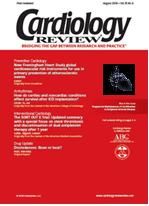Publication
Article
Cardiology Review® Online
Decreased weight and blood pressure resulting from lifestyle changes in a middle-aged patient
A 42-year-old generally healthy, but overweight, adult male was enrolled in the Prospective Registry Evaluating Myocardial Infarction: Events and Recovery (PREMIER) trial.
A 42-year-old generally healthy, but overweight, adult male was enrolled in the Prospective Registry Evaluating Myocardial Infarction: Events and Recovery (PREMIER) trial. He had a baseline blood pressure in the prehypertensive range (135/85 mm Hg) and was not taking antihypertensive medication. After completing the informed consent process and confirming his eligibility, the patient was randomly assigned to the established plus Dietary Approaches to Stop Hypertension (DASH) group and began attending a series of group intervention sessions aimed at helping him lose weight, increase exercise, and eat healthier foods. In all, the patient attended 25 of the 33 sessions that were held during the 18-month study. He especially liked learning the behavioral self-management techniques, such as self-monitoring (one of the most successful techniques in weight management), feedback, and problem solving, and setting a series of achievable short-term goals and specific plans to achieve those goals. He appreciated the support from the other participants at each group session.
In addition to the intervention sessions, the patient attended clinic visits at the start of the study and again at 6 and 18 months into the study. During these visits, staff members measured his blood pressure (at each visit), height, and weight; drew blood samples; gave him several questionnaires to complete; had him complete a treadmill test; and asked him to complete a 24-hour urine collection. At 6 and 28 months, he also received 2 unannounced phone calls to ask what he had eaten during the previous 24 hours. He attended briefer visits at 3 and 12 months to measure his weight and blood pressure and to answer a few questions about his health.
After the first 6 months of the study, the patient had reduced his systolic blood pressure by 11 points and his diastolic blood pressure by 6 points. After 18 months, his systolic blood pressure was up only 1 point from the 6-month reading, and his diastolic blood pressure was the same as it was at 6 months. He reduced his weight by 4% from the start of the study, cut back on his salt intake, and started eating more fruits, vegetables, and low-fat dairy products.
The results from the PREMIER trial confirm that relatively modest weight loss can help patients to achieve and maintain clinically significant reductions in blood pressure. The lifestyle changes required for weight loss—improved dietary quality and increased exercise—have additional health benefits. The relatively intense support required to help patients achieve and maintain weight loss is beyond the scope of routine primary care and requires a professionally staffed behavioral treatment program. Although such programs exist in most cities and through some managed care programs, they are not yet available to most patients. Further research is needed to test the cost-effectiveness of behavioral treatment programs and to develop more successful ways to help patients maintain weight loss over the long term.






